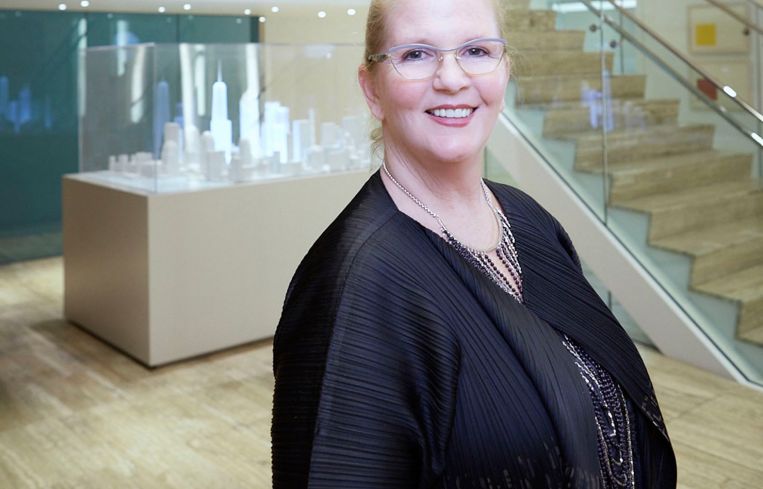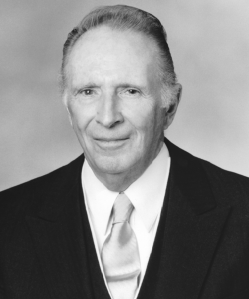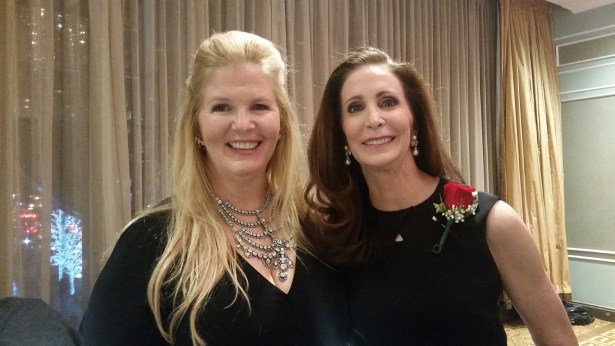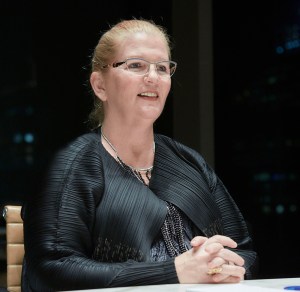How Does Darcy Stacom, a $60B Broker, Keep Work and Family All Together?
By Lauren Elkies Schram January 27, 2016 9:00 am
reprints
Darcy Stacom has worked hard to stake a claim at the top of the heap, and stay there.
In the last four years, Ms. Stacom, who recently turned 56, has twice been the number one professional at CBRE globally, and twice the number one investment professional globally at the firm. But she earned her stripes long before that. Back in 1997, The Wall Street Journal named her the “Queen of the Skyscrapers”—a moniker that stuck. (At the company’s recent Christmas party, Ms. Stacom received a crown and cape as her gift.)
Ms. Stacom, a vice chairman and head of the 20-person investment properties group (which includes eight brokers) for CBRE’s New York office, has been involved in some of the city’s biggest real estate transactions, like the $5.4 billion sale of Stuyvesant Town and Peter Cooper Village in 2006, the $2.8 billion sale of the General Motors Building in 2008 and last year’s sale of the Helmsley Building at 230 Park Avenue by Monday Properties to RXR Realty and Blackstone Group for $1.2 billion.
After a career at Cushman & Wakefield—where her father, the late Matthew Stacom, was a top broker with a 67-year career and her year-older sister, Tara Stacom, is a top-producing broker—Darcy decamped for CBRE in 2002. In her 35-year tenure (although she started in the business at 14 in C&W’s mailroom), she has completed over $60 billion in sales, financing, joint venture, leasehold and development transactions.
Commercial Observer: Why did you decide to make the move to CBRE 13 years ago?
Ms. Stacom: I didn’t feel at the time that Cushman had a great international network. They had international offices, but nothing was tied together nor was it really all that global. It was just that ability to break free and create my own legacy [from my father]. Not that I didn’t love dad’s legacy, but that’s kind of that female thing, too. I don’t know that a guy necessarily that had reached the level of the board of directors and the executive committee of the Real Estate Board of New York would have had that same shadow.

Did the legacy stay with Tara since she remained at Cushman & Wakefield?
Well, yeah, she stayed working with him, too. She worked with him until he really moved down to Florida [around 15 years ago].
Is she out of your dad’s shadow now?
Yeah. Definitely. Once he moved to Florida, I think it created a separation. I don’t think she ever had that same issue of wanting to break apart because they did do a lot of business together.
Speaking of your sister, in January 2012 I interviewed Tara for The Real Deal. I asked her if you two compete and she said: “Darcy’s in sales. I’m in leasing… When we see each other it’s Thanksgiving, it’s Christmas, it’s Easter and it’s holiday time.” I remember thinking that you guys don’t see each other that often.
We actually see each other more now. Once dad got ill, we kind of got smart and started taking more time to make sure we saw each other. We do compete occasionally. We competed for the Bank of New York-1 Wall listing [Darcy sold 1 Wall to Macklowe Properties]. When she’s competing in my space, it’s harder for her because she’s leasing and she’s having to bring in a sales broker. I don’t compete for leases, period.
Another question I asked her was how you guys were different.
About as extreme as you can get. Tara’s always very prepared. And she was very prepared in school. Probably people could look up my GPA and it’s not something I’m jumping up and down about… Tara’s always dressed perfectly and she looks awesome. I’m a mess [laughs]. It’s just not something I care about. She’s a great entertainer of clients and builder of relationships. I do virtually no client entertainment.

How do you network?
I probably just kind of network through industry events and make sure I meet people—and my clients always introduce me to my next clients. I’ve had three in the next month where people go out of their way to say they really loved the work that I did, and they need to meet me. And I am very direct with people. When I go home, I’m home. I’m digging in my garden. I’m hanging out with my daughters. My husband and I raised two kids and I was never more than 10 blocks from home. My first [apartment] was three blocks from work and then [my next] was 10 blocks from work. And it reduces a massive amount of anxiety. It really does. I say that to any young woman who wants to succeed in the industry. I’m like, the minute you have kids, you need to live nearby.
How old are your kids now?
Nineteen and 22. Teal [Kraus] is at Elon University and Amber [Kraus] is at Tishman Speyer in the sustainability group.
Any other differences between you and Tara?
Tara comes across as extremely professional and poised and her presentations are extremely well thought out. I come across as probably somebody that you’re not sure is successful [laughs]. Who’s easier to approach? You’re not like, “Wow, should I approach that woman?” And my presentations are designed to make people laugh and relax and have a conversation. I do go over things a lot, but only those things I view as very, very important and after that I will trust the people below to kind of get it done.
So you’re not a control freak?
I used to be and I’m not anymore. I’m definitely a control freak for the things that matter. But I’ve learned to step back from the things that don’t.
What about your sister?
I don’t know. I haven’t worked with her in a while. So, you’d have to ask her. It’s not an easy habit to break.
You started to give advice for women to be in close proximity to the office. Since this is the Women in Real Estate issue, what other advice would you offer for women starting out in investment sales?
I think the thing is a lot of women are afraid of math. They can be decent at it, but then you say, you have to do all of this financial modeling, etc., etc., they like go, “Can I skip that step?” You can’t today. Another famous quote of my father’s when I quit working for him, when I said I was going to sell office buildings, he said, “You? You’re a math moron. You couldn’t sell an office building if it hit you in the face.” And I knew where he was coming from [laughs]. It took me a long time to learn it, but I learned it.
You had been doing leasing?
This was like my first two years in the business. And the only way to leave him was to leave the department. My sister Stacy had already gone Downtown. She lives in Montana now. My way out was to sell buildings. But it’s like anything, you practice it enough, you do it enough, and you figure it out, right?
When I asked Tara how you two were different, she said: “[As kids] I was right attack wing in lacrosse and field hockey, and Darcy liked goalie. You have to be fearless to stand in a cage… I’ve got to outmaneuver, outrun and be very fast and artful in being the scorer on the team.” What’s your answer?
I think I was the first person to have to wear a hockey mask in a goal cage and that was because of the way Tara would wail the ball at me [laughs]. Her best shot was right past the goalie’s head on the right or the left. And given that we were kids at the time and didn’t always get along, it put me in a pretty dangerous spot [laughs].
‘If you’re not prepared to begin with a financial base, you’ll never make it all the way through.’
It seems like women who go into commercial real estate are really choosing between banking and real estate, not between commercial and residential real estate.
[The deals are] like legal, too. All of these deals have become so structured. There used to be a bit of a shortcut. There’s no shortcut anymore, like none. If you’re not prepared to begin with a financial base, you’ll never make it all the way through. And then the other thing is like, get out there and engage. You don’t have to engage at night, because that’s not necessarily easy to do. But get out there and engage in the industry events, get out there in the not-for-profit world. Real estate is so deeply intertwined with the not-for-profit world. You’ll meet people that way. People think they have to get out and go to all of the different events—which can be pretty overwhelming. You go to an event and if you don’t know Bill Rudin [chief executive officer and vice chairman of Rudin Management Company], you’re not saying hello to Bill Rudin. So it’s better to go to a lunch or presentation or whatever and you might actually have a shot at talking to them.
Should some up-and-coming broker bother approaching a bigwig at an event?
I have people come up to me all the time. Some of them actually impress me to the point that I’ll agree to take a call.
What do they do to impress you?
It’s just some bit of knowledge that they’ll give. “I saw you worked on this; I worked on something next door and this is what I saw…” If somebody walked up and said to Bill Rudin, “I noticed at your last lunchtime series that the sound wasn’t good or the sight lines could have done this,” he will probably go back and mention that to somebody on his team.
Why do you think there is still such disparity in female representation between commercial and residential brokerage?
I think it really is true that women tend to be nurturing. Kids still look to their mom. We tend to have that softer side—and this is a hardcore business, make no mistake about it. So when you run into that wall, and run into that wall, and run into that wall, and you run into it a million more times, you’ve got to be the one to pick yourself up and keep on going, because no one else can do it for you. I think a lot of women just go, “There are better ways to make money,” or “I just don’t want to do that.”
Any other advice for women considering the field?
Don’t quit when you have a kid. A lot of people then have a really hard time balancing and that’s where I said the thing, live close by if you can. And by the way, we didn’t live in the greatest neighborhood. We lived at 57th Street and [Avenue of the Americas]. [She and her husband now live in Sutton Place.]

Have you done sales in the outer boroughs?
We’ve done a lot in Brooklyn. We’ve done some in Queens, the main part of Queens, and then we’ve also done Long Island City. Not much in the Bronx, [but] we’ve done some. And I don’t think we’ve ever done anything in Staten Island. I think Staten Island is going to be doing some pretty big things in this next cycle because of the Staten Island [observation wheel] and the outlet mall they’re building. You drop an outlet mall out there and you got a free ferry ride to it as opposed to driving to Woodbury Commons [laughs], it could be killer.
Do you have a minimum with deals?
Not really. For part of the Helmsley estate—granted it was the bigger Helmsley estate—I think we handled a $2 million transaction. I’m doing a cleanup that’s probably about that size, too.
Your husband is Christopher Kraus, a managing director at JLL. How much do you guys talk shop?
Not too much. We try really hard not to. We’ll talk general industry but we don’t talk each other’s specific transactions because it’s just a lot better that way. And he doesn’t come to CB events and I don’t go to JLL events. You don’t want somebody to be like, “Darcy ended up selling that building and you knew about it.” So he’s always like, “I have no idea,” and I’m the same way. We just try to keep an absolute separation, but we can talk about the general industry and laugh about it.
You’re more successful than him, right?
Yeah.
You were named the “Queen of the Skyscrapers” by The Wall Street Journal in 1997. How has that moniker helped or hurt you?
I would say it’s definitely helped. It’s life’s small ironies that the day that article came out my second daughter Teal was in the hospital and literally we were at our wits’ end. They couldn’t figure out what was wrong with her. She had spiking 105-degree fevers. Her tongue was swollen. It was disgusting. We were devastated, convinced we were losing our daughter. I don’t think I even read that article for four days afterward. So, the euphoria of the moment was when we found out what was wrong with Teal. I think we found out the next day what it was.
What was it?
Kawasaki disease, which is like childhood Legionnaires’ disease [a type of pneumonia caused by bacteria]. We had all read about Legionnaires’ disease killing people, right? It’s funny, but the week before, or two weeks before, [the Journal called Richard Fisher] “The Prince of the City.” So he writes me a note: “The prince would like to speak to the queen.” It was hysterical. I’ve never promoted it.
It’s in your CBRE profile.
That was written by the firm.
It was just your birthday.
Yup. I had this guy we were interviewing for something and he’s like, “So how much longer are you going to be working?” I’m like, “Wow.” I’m thinking, that’s not very subtle and not really a good sign of a good broker.
Was that the end of him?
In my head, yeah, pretty much.



